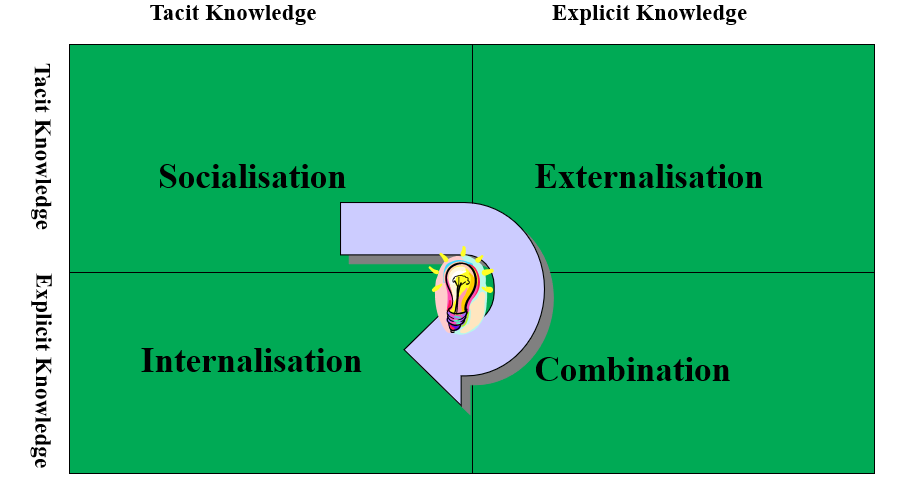The Siamese Twins of Performance Support – eLearning + Knowledge Management
When I first started in the world of eLearning some 20 years ago, it was on the back of my MBA studies which included both Innovation and Knowledge Management (KM). In those days, KM was very much the domain of the IT folks who saw it as a technology problem. It is though very much a people problem but one where technology can enable and support our people in having information they want at the point & time of their need. A bit like Siamese Twins, separated at birth but now coming back together again.
One really useful model which helped shape my thinking is that of “The Knowledge Spiral”, (Nonaka & Takeuchi, 1995 “The Knowledge Creating Company: How Japanese Companies Create the Dynamics of Innovation”)

We are all familiar with the “Water Cooler Culture” – people learn all sorts of things through casual meetings around the water cooler, in the pub and on the Golf course to name but a few! This sharing of tacit information is what Nonaka & Takeuchi term as “Socialisation”. In the bad old days, we had the notion that information was power – you will see as we go along here that in fact, the opposite is true!
The next stage is what they term as “Externalisation” – back in 1995 this was not as easy as it is today though. By creating this article, I am externalising my thinking via a blog post. And we have so many other ways we can do this now.
The magic starts to happen as we combine different bits of information from others who have shared and internalise this as new knowledge which can continue around the spiral.
You can start to see why this model appeared both in an Innovation, Creativity and Change course as well as part of a KM one!

I have mapped just a few of the applications that enable the different parts of the process – there are many more of course – just take a look at Jane Hart’s “Top Tools for Learning 2020” and you’ll see most of these have a role to play in the Knowledge Spiral.
Whilst Data just looks like a small word in this picture, it has become a vital part of our work in L&D and my next article will focus on this topic.
There are some skills we need to make this work which have been well described by Harold Jarche: (https://jarche.com/2014/07/four-basic-skills-for-2020/)
The basic skills ALL workers will need are:
- Personal knowledge management skills so that they can make sense of, and learn from, the constant stream of information that they encounter from social channels both inside and outside the organisation.
- Collaboration skills so that they can share their knowledge as well as work and learn productively and purposefully in teams, communities of practice, and social networks.
Please note though that this isn’t about social learning per se – information is everywhere from unreachable PC hard drives, shared drives through to file sharing applications such as DropBox, Drive, Sharepoint, Teams and many many more. And if it can’t be found, then it has no value! We must make it easy to find. And it isn’t just about electronically stored information – despite COVID19, there will still be lecture and ILT types of delivery albeit in smaller numbers. Neil Lasher makes some great points about availability in his “The 4A’s of Learning Design” – some 16 years old but still of relevance today.
But this isn’t just about enabling our people – every night, all of our tacit knowledge walks out of the door and we hope that it all comes back the next day! In these days of rightsizing and outsourcing, that isn’t always the case though. Add to that natural turnover and retirements, and this could mean that over the next 5 years, some 50% of the current implicit knowledge held by our people walks out of the door and doesn’t come back. Ever. (real data from analysis I did at a former employment).
It doesn’t have to be this way though!
If we get the culture right and encourage our people to share what they know, we can capture more of this knowledge whilst they are still here.
In summary, I can’t put it all much better than this quote, attributed to Al Gore:
“Our challenge is to process data into information, refine information into knowledge, extract from knowledge understanding, and then let understanding ferment into wisdom”.
attributed to Al Gore
I leave you though with this final thought:
Implementing systems is no guarantee that knowledge will flow any more freely around the organisation than jam flows through a sieve
(James Mortleman, Business & Technology, 1998)
